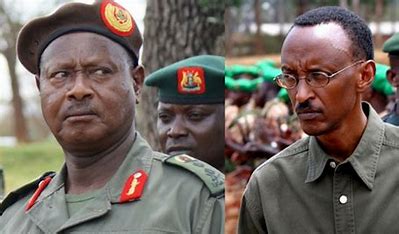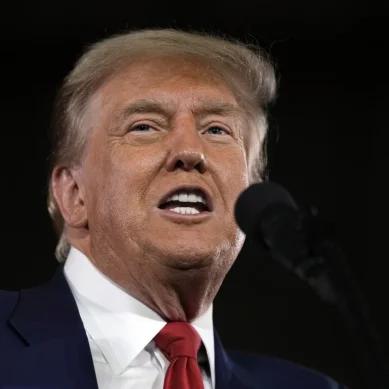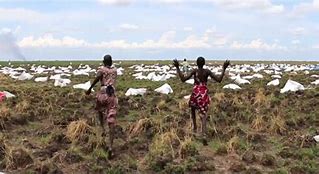
Since 1986, there has been a general outcry in Uganda that one small ethnic group to which most of the guerilla fighters of Luwero belonged accessed power in Kampala and has been grabbing all the resources. This includes job opportunities that are shared by the group is ethnically related to the two individuals who captured power in Kigali in Rwanda.
They were comrades-in-arms during Uganda’s guerilla war that hoisted President Yoweri Museveni to power. Museveni returned the favour by resourcing and propping Paul Kagame’s ascendancy to power in Rwanda. Both are Tutsi, but never openly talk about their connected filial thread.
It is not surprising that the two are jostling – militarily – for hegemony in eastern Democratic Republic of Congo, where their Tutsi community’s presence is overwhelmingly huge compared to the native ethnic groups.
The Tutsi who captured power in Rwanda fully participated in the National Resistance Movement (NRM) guerilla war in Luwero and in subduing the resistance of the people of Teso and Northern Uganda, before they waged an invasion of Rwanda from Uganda and from within the NRA.
They called themselves Rwandese Patriotic Army (PRA) but they were a mutant or mirror image of the NRA. Before PRA invaded Rwanda, it’s elements participated in everything good and bad in Uganda.
The good thing was setting up an administration to run the country after the fall of Okello military Junta.
Initially they participated in the administration and security organs that President Tibuhaburwa Museveni established, and held important positions. For example, the original leader of PRA, Fred Rwigyema held the position of State Minister for Defence and the current President of Rwanda, Paul Kagame, headed a top position in the Chieftaincy of Military Intelligence (CMI).
They participated in the atrocities in Teso and Northern Uganda. They certainly were helping President Tibuhaburwa Museveni in order to be helped in return to take power in Rwanda. This confirmed the saying that no foreigner helps you more than he or she helps himself.
So, when President Museveni implemented the IMF/World Bank retrenchment policy, many Rwandese benefited in terms of job opportunities. They occupied the positions from which Ugandans were retrenched, ostensibly to create a small efficient and effective workforce. For example an OB of mine at the University of Dar-es-Salaam in the Department of Zoology, who later proceeded to UK for a bachelor’s degree in economics and a masters and a PhD in the same field, got a job in the Bank of Uganda. He then proceed to Rwanda to serve as Minister of Finance. He ended up as executive director of the African Development Bank. He is Dr Donald Kaberuka.
Apart from participating in the atrocities in Teso and Northern Uganda, which included burning of almost all passengers in a train wagon in Mukura in Teso, they participated in robberies of banks and cooperative unions and societies, and in ransacking industries and/or factories in Jinja.
It is true that the small ethnic group that the rulers of Rwanda and Uganda belong to has continued to dominate employment opportunities in every sector of the economy. They also dominate business, the army, police, prisons and different paramilitary groups, intelligence and even administrative jobs such as those of resident district commissioners (RDCs) and permanent secretaries.
Further research is needed to confirm or reject the assertion herein. However, there is evidence to suggest that the problem has graduated to a major issue in governance in Uganda. For example a thorough analysis of employment in the key positions of the oil and gas industry (see below) will reveal that the issue of ethnicisation in Museveni’s Uganda has become deep-rooted and that no attempt in made to conceal it.
Employment in Uganda’s petroleum, oil and gas management
- Ernest N T Rubondo – executive director
- Irumba Bright – director exploration
- Dozith Abeinomugisha – director refinery, transmission and storage
- Penina Aheebwa – director technical support
- Dr Joseph Kabusheeshe – director environment
- Justine Kasigwa Agaba – director data management
- Pamela Mbabazi – oil wealth development
- Martin Muhangi – policy formulation/analyst
- Wilson Bahati Kazi – fiscal director
- Jackson N M Byaruhanga & Jackson A Mwakali – HRM
- Roberts K Muriisa & Specioza Twinemasiko – land rights and surveying
- Byaruhanga Musiime Chris – production
One thing is true. If we are to combat poverty and corruption effectively we must simultaneously combat ethnicisation, which is now detectable in every sphere of the economy and life.
For example, apart from ethnicisation of employment, land grabbing and corruption have also been ethnicised. Persistently, consistently and continuously the majority of land grabbers are tending to belong to the dominant ethnic group in our current politics. These are either those who were active in the bushes of Luwero or those connected to them.
The majority of the 1500 billionaires in Uganda are traceable from this group or those connected to it in terms of power, business, etc.
Apparently, even poverty is now thoroughly ethnicised, with the majority of the poor and needy belonging to the traditional indigenous groups of Ugandans distributed mainly in Eastern, Southern and Northern Uganda. It should, however, be emphasized there are many poor and needy among the people of Western Uganda who are not connected to the very few families in power or connected to power.
I should end this article by stating that ethnicisation can also assume a social, cultural and environmental dimension, apart from the political and economic dimension. When all these dimensions interact, like they did in the defunct apartheid South Africa, the country can manifest as if it is sowing seeds of separate development or segregation. That is apartheid-like manifestation. Accordingly, it is as if Uganda is reinventing apartheid or ethnic segregation.
Environmentally and ecologically speaking, it is dangerous when one ethnic group with power, money and security excludes other ethnicities from land and other natural resources or pushes them to the margins of nature where survival is difficult. There is need to rethink Uganda to make it a liveable home for all and to ensure all the different ethnic groups of the country benefit from our resources and opportunities as was the case in the past. If not then Uganda is a disaster waiting to happen.
For God and my country
- A Tell report / By Prof Oweyegha-Afunaduula, a former professor in the Department of Environmental Sciences of the Makerere University, Uganda











